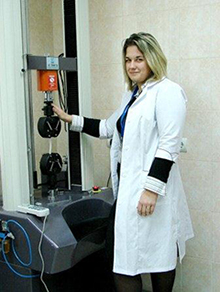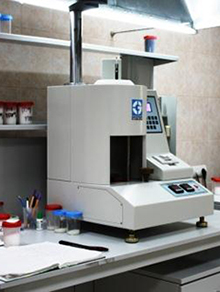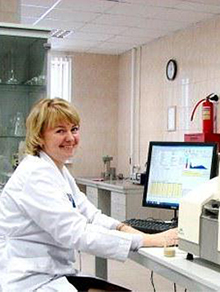Products’ conformity to standards and specifications is ensured by the Quality Control Service (QCS).



Functions of QCS:
The QCS activities are regulated and approved by the certificate from Bryansk CSM FBE.
QCS key equipment:
DSC 204 F1 Phoenix® dynamic heat flux differential scanning calorimeter with the working temperature range of –160 °C to 600 °C (measurement of melting temperature, oxidative induction time, crystallization temperature, thermal effects of chemical reactions);
PFA-378 flame photometer (measurement of Ca and Mg ion contents);
AI7000-M universal testing machine + thermal chair with cryogenic capabilities (physico-mechanical properties of polymers: tension, compression, bending; temperature range: –60 °C to +250 °C) ;
Analysette 3 vibratory sieve shaker (fractional sifting of clay);
Portable Shore A, D hardness tester (measurement of indentation hardness of polymer materials);
X-Rite spectrophotometer No. 2 (measurement of surface color characteristics);
Impact strength testing poppet Charpy and Izod impact strength measurement (measurement of impact strength of: polymers, wood, ceramics, glasses, epoxy blends, rubber);
Microscope (primary inspection of films for impurties (larger than 20 µm), polymer thread texture, evaluation of supermolecular features; evaluation of crystallite sizes and polymer crystallinity degrees) ;
MS-70 thermogravimetric moisture analyzer (measurement of moisture content, volatile contents in polymer at operational monitoring) ;
Low-temperature brittleness tester with the temperature range of с температурным диапазоном: от –70 °C to +25 °C (measurement of materials' impact resistance to failure at negative temperatures);
Vicat softening temperature tester per GOST 150088) (measurement of loaded softening temperature of polymer blends; temperature measurement range: +25 °C to +300 °C);
FTIR spectrometer for the analysis of emitted gases in real time (measurement of IR spectrum of the specimen in transmission or reflection mode, identification of polymer matrix type in the specimen, identification of inorganic filler in the specimen, vapors and gases library included) ;
TOmM-01 thermometer (measurement of electrical resistance in polymers).